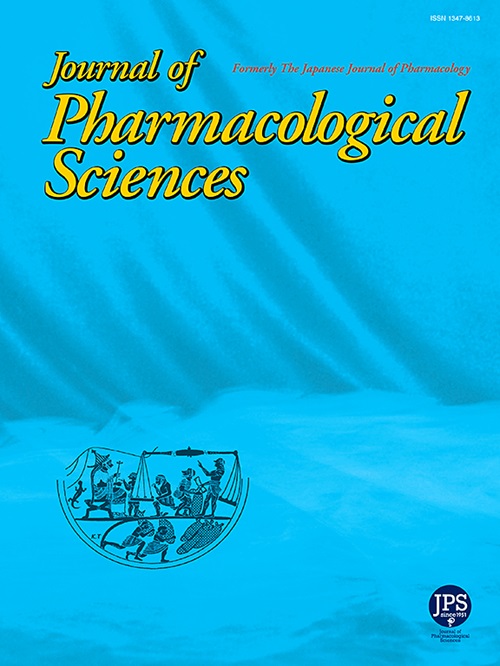Centrally administered prostaglandin E2 suppresses the micturition reflex in rats
IF 2.9
3区 医学
Q2 PHARMACOLOGY & PHARMACY
引用次数: 0
Abstract
Prostaglandin E2 (PGE2) facilitates the micturition reflex at the lower urinary tract and spinal cord levels. However, the roles of brain PGE2 in reflex regulation remain unclear. Therefore, we aimed to investigate the effects of intracerebroventricularly administered PGE2 on the micturition reflex. We further investigated whether the PGE2-induced responses were dependent on the sympathetic nervous system (SNS) and identified the brain E-prostanoid receptor subtypes (EP1–EP4) involved in PGE2-induced effects. Intracerebroventricularly administered PGE2 (0.1, 0.3, or 1 nmol/rat) dose-dependently increased the intercontraction intervals (ICI) and threshold pressure required to induce micturition (TP) without altering maximal voiding pressure in urethane-anesthetized (0.8 g/kg, ip) male rats. PGE2 (1 nmol/rat) significantly increased the mean blood pressure; 6-hydroxydopamine-induced chemical sympathectomy ameliorated this increase. In contrast, chemical sympathectomy had no significant effect on the PGE2-induced increases in ICI and TP. Intracerebroventricularly pretreated SC51322 (EP1 receptor antagonist, 100 nmol/rat) and PF04418948 (EP2 receptor antagonist, 100 nmol/rat), but not L-798106 (EP3 receptor antagonist, 100 nmol/rat) or L-161982 (EP4 receptor antagonist, 100 nmol/rat), significantly attenuated the PGE2 (1 nmol/rat)-induced changes in ICI and TP. These results suggest that centrally administered PGE2 suppresses the rat micturition reflex through brain EP1 and EP2 receptors, independent of SNS activation.
中央给药前列腺素E2抑制大鼠排尿反射
前列腺素E2 (PGE2)促进下尿路和脊髓水平的排尿反射。然而,脑PGE2在反射调节中的作用尚不清楚。因此,我们旨在研究脑室内给药PGE2对排尿反射的影响。我们进一步研究了pge2诱导的反应是否依赖于交感神经系统(SNS),并确定了参与pge2诱导作用的脑e -前列腺素受体亚型(EP1-EP4)。脑室内给药PGE2(0.1、0.3或1 nmol/大鼠)剂量依赖性地增加了尿素麻醉雄性大鼠(0.8 g/kg, ip)的收缩间期(ICI)和诱导排尿(TP)所需的阈压,而不改变最大排尿压力。PGE2 (1 nmol/大鼠)显著升高平均血压;6-羟多巴胺诱导的化学交感神经切除术改善了这种增加。相比之下,化学交感神经切除术对pge2诱导的ICI和TP的增加没有显著影响。脑室内预处理SC51322 (EP1受体拮抗剂,100 nmol/大鼠)和PF04418948 (EP2受体拮抗剂,100 nmol/大鼠),但未处理L-798106 (EP3受体拮抗剂,100 nmol/大鼠)或L-161982 (EP4受体拮抗剂,100 nmol/大鼠),显著减弱PGE2 (1 nmol/大鼠)诱导的ICI和TP的变化。这些结果表明,中央给药PGE2通过脑EP1和EP2受体抑制大鼠排尿反射,独立于SNS激活。
本文章由计算机程序翻译,如有差异,请以英文原文为准。
求助全文
约1分钟内获得全文
求助全文
来源期刊
CiteScore
6.20
自引率
2.90%
发文量
104
审稿时长
31 days
期刊介绍:
Journal of Pharmacological Sciences (JPS) is an international open access journal intended for the advancement of pharmacological sciences in the world. The Journal welcomes submissions in all fields of experimental and clinical pharmacology, including neuroscience, and biochemical, cellular, and molecular pharmacology for publication as Reviews, Full Papers or Short Communications. Short Communications are short research article intended to provide novel and exciting pharmacological findings. Manuscripts concerning descriptive case reports, pharmacokinetic and pharmacodynamic studies without pharmacological mechanism and dose-response determinations are not acceptable and will be rejected without peer review. The ethnopharmacological studies are also out of the scope of this journal. Furthermore, JPS does not publish work on the actions of biological extracts unknown chemical composition.

 求助内容:
求助内容: 应助结果提醒方式:
应助结果提醒方式:


